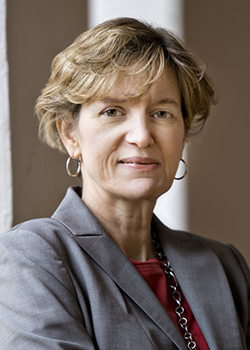Andrews Appointed to Virginia Coastal Resilience Technical Advisory Committee
Elizabeth Armistead Andrews, Professor of the Practice of Law and Director of William & Mary Law School’s Virginia Coastal Policy Center (VCPC) has been appointed by Virginia Governor Ralph Northam to the Virginia Coastal Resilience Technical Advisory Committee (TAC).
The appointment comes as the result of Governor Northam signing Executive Order Seventy-One, which establishes the TAC.
“The Law School community is happy and proud, and not in the least surprised, that Professor Andrews has been selected for this position,” said A. Benjamin Spencer, Dean of William & Mary Law School. “Her expertise and work with the Virginia Coastal Policy Center will be invaluable in furthering the important work of the Technical Advisory Committee.”
The TAC is designed to facilitate coastal resilience planning through coordination among state and local leaders, scientists and engineers, and impacted stakeholders. The efforts will encompass many policy initiatives, government agencies and federal resources.
The group will also be responsible for developing recommendations for specific, place-based, coastal adaptation and protection strategies.
The TAC includes representatives from the eight coastal Planning District Commissions, academic and technical experts, and state and federal agencies. (See a full list.) The group will hold its first public meeting on Monday, December 14.
The creation of the TAC was one of three executive actions Governor Northam announced on December 3 to improve coastal resilience and protect Virginia communities. The other two actions include: 1) elevating the Virginia Coastal Zone Management Program to report to the Commonwealth’s Chief Resilience Officer, and 2) issuing a statewide request for proposals for technical engineering assistance in developing the Virginia Coastal Resilience Master Plan.
The three steps will directly support the Virginia Coastal Resilience Master Planning Framework announced in October.
Under Andrews’s leadership, the VCPC has assisted with preparation work in developing the Coastal Resilience Master Plan framework. VCPC student Kristi Gennette ’19, for instance, wrote a white paper for Rear Admiral (Retired) Ann Phillips, Special Assistant to the Governor for Coastal Adaptation and Protection. Gennette’s research provided an inventory of state coastal resilience authorities and funding mechanisms to help Virginia determine the best approach to funding resilience efforts.
The VCPC likewise featured Admiral Phillips’s updates on development of the Master Plan framework during the Center’s annual conference in 2019 and its webinar in October 2020.
Andrews joined William & Mary Law School in 2016. In addition to being Director of the Virginia Coastal Policy Center, she currently is serving as Interim Director of Clinical Programs. She formerly served as Senior Assistant Attorney General and Chief of the Environmental Section of the Virginia Office of the Attorney General. She also served as the Water Policy Manager for the Virginia Department of Environmental Quality, where she worked closely with the legislature, the regulated community and environmental organizations to address the water quality and quantity challenges facing Virginia, particularly its coastal areas.
Andrews is a graduate of William & Mary and received her Juris Doctor degree, summa cum laude, from the Washington College of Law at American University. Among other professional activities, she serves as the Virginia representative on the Chesapeake Bay Program’s Climate Resiliency Workgroup, and as a member of the Board of Governors for the Virginia State Bar Environmental Law Section.
The VCPC partners with William & Mary’s Virginia Institute of Marine Science and Virginia Sea Grant, and works with scientists, local and state political figures, community leaders, the military, and others on coastal resilience issues.
About William & Mary Law School
Thomas Jefferson founded William & Mary Law School in 1779 to train leaders for the new nation. Now in its third century, America’s first law school continues its historic mission of educating citizen lawyers who are prepared both to lead and to serve.